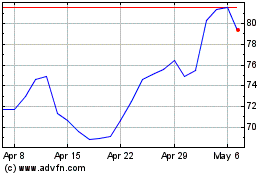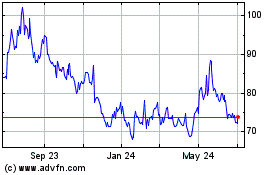By Newley Purnell
As the U.S.'s top tech brands ramp up operations in India, they
are running into unexpected resistance: their Chinese equivalents
stepping in to bolster their Indian competitors with billions of
dollars in investments and expertise.
In recent years, Amazon.com Inc., Facebook Inc., Uber
Technologies Inc. and others have announced ambitious plans and
rapid rollouts in India, calling it one of the last great untapped
internet economies.
The U.S firms plan to use their massive war chests to dominate
India's market of more than 1.2 billion people, most of whom are
just now connecting to the internet. The companies have been able
to use their capital to capture significant market share, but local
startups have put up a good fight, going toe to toe with the U.S.
giants thanks to help from China.
More U.S. tech firms are pouring money into their Indian
subsidiaries, expanding their cutting-edge offerings directly into
the market as it begins to mature, and largely without the
regulatory challenges found in China. Amazon is investing $5
billion in its operations in India, while Uber is putting more than
$1 billion into the country. India is Facebook's second-biggest
market in terms of users after the U.S., and more people use its
WhatsApp messaging platform in the country than anywhere else.
But joining the battle for India's internet newcomers are
China's tech titans -- including Alibaba Group Holding Ltd.
(e-commerce), Tencent Holdings Ltd. (social networking) and Didi
Chuxing Technology Co. (ride-hailing) -- all of which are providing
muscle to their Indian counterparts.
Alibaba this month led a $200 million round of fundraising into
a new e-commerce arm of Indian mobile-payments and online-shopping
startup Paytm. That followed its 2015 investment, with its
financial-services affiliate Zhejiang Ant Small & Micro
Financial Services Group, of more than $500 million for a 40% stake
in One97 Communications, Paytm's parent company.
"India is an important emerging market with great potential,"
said an Alibaba spokesman.
Chinese interest in Indian startups has shot up just as U.S.
investment has waned. In 2015 and 2016, Chinese tech firms invested
a total of $3.2 billion in Indian startups, more than twice the
$1.4 billion invested in Indian startups by U.S. companies during
those years, according to AVCJ Research in Hong Kong.
Indian startups -- sometimes clones of the American trailblazers
-- thrived for years as Western companies showed little interest in
emerging markets. When U.S. companies turned their attention and
money to the Asian subcontinent, they made rapid gains and may have
expected to easily outspend and outlast their tiny local rivals,
said Neha Dharia, a Bangalore, India, analyst with London
technology research firm Ovum.
But Indian startups have fought back with strong local brands
and Chinese backing. U.S. firms likely "didn't expect the local
guys to give them such a run for their business," she said.
An Amazon spokeswoman declined to comment on how Chinese
investments have changed the playing field in India, but said the
company has made rapid strides in the country and is "committed to
long-term investment" in e-commerce infrastructure and technology
in India.
Uber and WhatsApp declined to comment. Facebook didn't respond
to requests for comment.
Chinese firms may have an edge in India because its budding
internet economy is familiar territory. With tens of millions of
new users connecting to the internet for the first time via
low-cost smartphones and affordable data plans, India's startup
environment today compares with China's a decade ago, some analysts
say -- when rapid adoption of the web and strict government
controls on foreign firms allowed Chinese web companies to
flourish.
Many Chinese firms have launched their own brands directly in
India but most have failed to take off. The English-speaking
populace that dominates India's internet is more familiar with
American and local names. As a plan B, the Chinese leaders are now
buying into Indian startups eager for money as they try to survive
the competition from U.S. giants.
Chinese ride-hailing app Didi, which proved it could beat a
global leader last year when it forced Uber to give up on China,
has had a stake in ANI Technologies Pvt. Ltd. -- the company behind
India's largest Uber competitor, Ola -- since 2015.
Last year, Tencent, which is behind China's wildly popular
WeChat social-networking app, led a $175 million fundraising round
in New Delhi-based messaging app Hike Ltd., which competes with
WhatsApp.
The Chinese companies are offering more than cash. They are
giving Indian companies expertise in how to tailor services to a
vast, diverse and less affluent populace.
Alibaba frequently hosts Paytm employees at its offices and
sends staff to India to encourage the exchange of ideas, said
Madhur Deora, Paytm's chief financial officer.
"It's really the scale and the scope" of operating in a
billion-person economy that Alibaba is able to help with, he
said.
Alibaba's senior managers have provided input as Paytm has
grown, offering insight on the right way to engineer Paytm's app,
for instance, based on ways mobile usage exploded in China.
China's Uber rival, Didi, is helping Ola untangle the problems
that come from the scale of serving a billion-person economy while
juggling hundreds of thousands of drivers. The "enormous and
complex" ride-sharing demands require "creative solutions," said a
Didi spokeswoman.
Messaging app Hike, which has about 100 million users in India,
has been getting advice from Tencent on how to better serve the
Indian market. One feature tailored to India allows users to share
music and video files between their phones without using the web or
data.
Tencent executives are helping roll out many new services so it
can become, like WeChat, a one-stop platform for not just sending
messages, but also for consuming news and more, said Kavin Bharti
Mittal, Hike's founder.
"These guys have built what we're trying to build," he said.
"India's economy and population has many more similarities to China
than the U.S."
(END) Dow Jones Newswires
March 29, 2017 05:44 ET (09:44 GMT)
Copyright (c) 2017 Dow Jones & Company, Inc.
Alibaba (NYSE:BABA)
Historical Stock Chart
From Mar 2024 to Apr 2024

Alibaba (NYSE:BABA)
Historical Stock Chart
From Apr 2023 to Apr 2024
